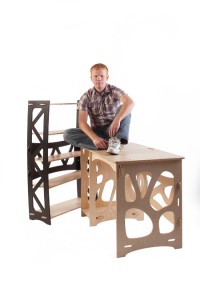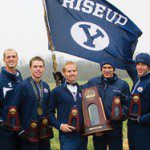Pain pays, for the first Student Innovator of the Year.

IDEA-esque, but with more enterprise, Clark Davis’ Gypsy furniture won him first place. He also won third.
Mechanical engineering major Clark E. Davis (BS ’10) is pained by a lot of things. Like college housing contracts that expire a week before new contracts begin. Like cramming all his earthly possessions into his ’95 Ford Escort during those weeks. Like moving his self-made solid oak desk six times over the course of his BYU career.
But moving that desk sparked an idea that earned Davis the title of Student Innovator of the Year (SIOY).
At the Ira A. Fulton College of Engineering and Technology’s first-ever SIOY competition, Davis told the panel of alumni engineer, entrepreneur, and venture-capitalist judges to time him. Then, in less than 60 seconds, he assembled a sturdy, stylish wood desk without a single screw. It’s one piece in Gypsy, Davis’ line of “furniture for the mobile population.” He makes bookcases too.
“I tried to make Gypsy so it feels like putting Legos together,” says Davis. The best part: the desk packs easily into, yes, a ’95 Ford Escort.
The SIOY judges awarded Davis first place for Gypsy—and third place for Uppercase, an overhead storage system that, filled with feathers or cinder blocks, as Davis demonstrated, takes the same exertion to close.
“He’s got 25 things going at once,” says Spencer P. Magleby (BS ’83), Fulton College associate dean. “My guess is that boy is go, go from morning till night.”
It’s true. Davis keeps a “pain journal” of annoyances to remedy, and turning pages of pain into working inventions takes up most of his time and money. With his $4,000 SIOY winnings, Davis will further develop his designs. But first he bought . . . groceries. “I had like $14 in one account and $1.70 in another,” he says.
To help SIOY hopefuls with the expenses of innovation, the Fulton College offered $400 loans that were forgiven when students entered the contest. The Marriott School also pitched in, with the Rollins Center for Entrepreneurship and Technology cosponsoring the event and the Peery Foundation, a partner of BYU’s Ballard Center for Economic Self-Reliance, providing a $2,500 fellowship for the best humanitarian innovation. The convergence of engineering and entrepreneurship, says the Fulton College’s dean, is strategic.
“We have a lot of students interested in inventing, . . . in, I suppose, being the next Bill Gates,” says Dean Alan R. Parkinson (BS ’77). “That innovation fits well within our college, and if students wish to go on to the next step, which would be to commercialize, they have a terrific business school across the way.”
Davis completed a BYU business minor and hopes to eventually work for himself. And he’s still logging away annoyances in need of solutions, like dealing with ice on his windshield and having to look at a touch screen while typing. As he puts it, “It’s thrilling to find a pain.”









